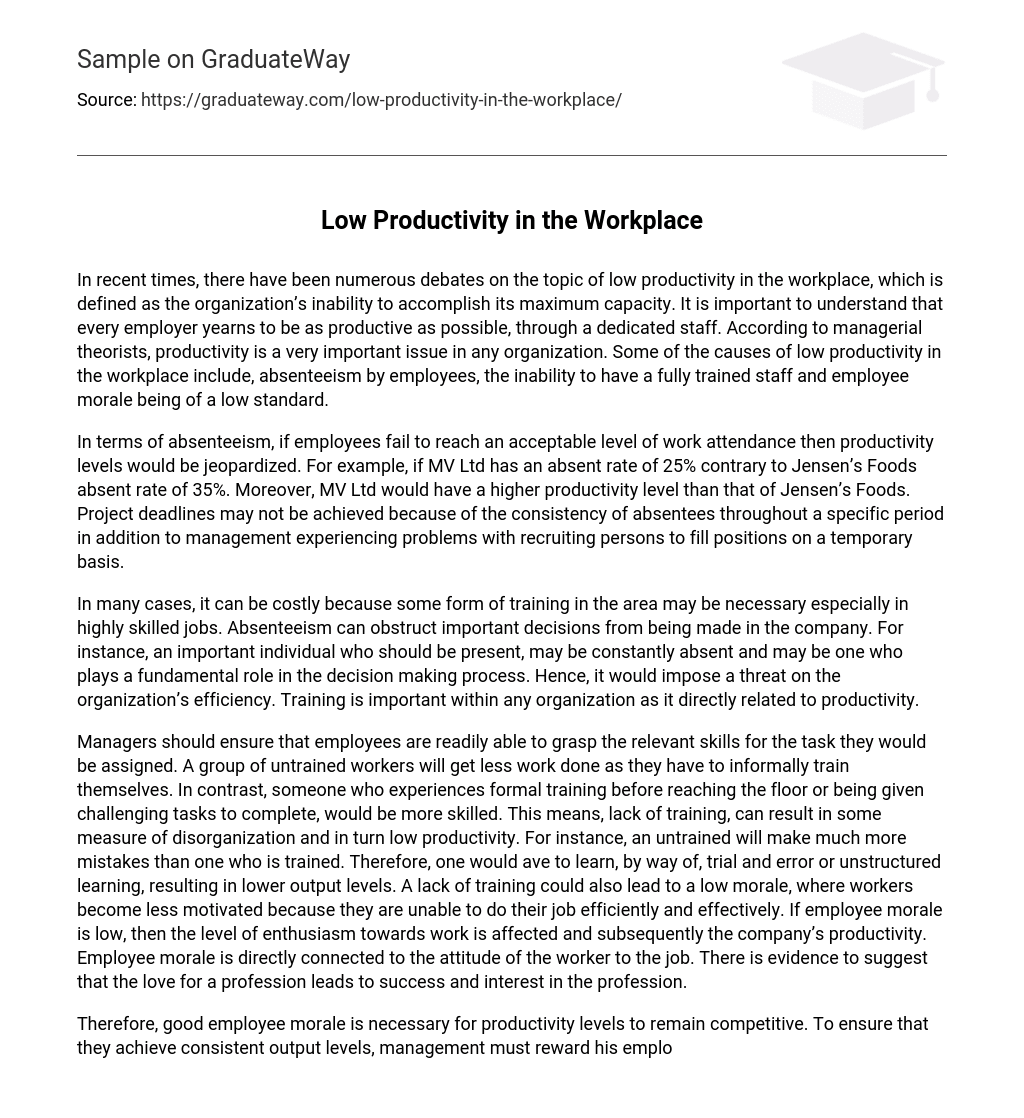In recent times, there have been numerous debates on the topic of low productivity in the workplace, which is defined as the organization’s inability to accomplish its maximum capacity. It is important to understand that every employer yearns to be as productive as possible, through a dedicated staff. According to managerial theorists, productivity is a very important issue in any organization. Some of the causes of low productivity in the workplace include, absenteeism by employees, the inability to have a fully trained staff and employee morale being of a low standard.
In terms of absenteeism, if employees fail to reach an acceptable level of work attendance then productivity levels would be jeopardized. For example, if MV Ltd has an absent rate of 25% contrary to Jensen’s Foods absent rate of 35%. Moreover, MV Ltd would have a higher productivity level than that of Jensen’s Foods. Project deadlines may not be achieved because of the consistency of absentees throughout a specific period in addition to management experiencing problems with recruiting persons to fill positions on a temporary basis.
In many cases, it can be costly because some form of training in the area may be necessary especially in highly skilled jobs. Absenteeism can obstruct important decisions from being made in the company. For instance, an important individual who should be present, may be constantly absent and may be one who plays a fundamental role in the decision making process. Hence, it would impose a threat on the organization’s efficiency. Training is important within any organization as it directly related to productivity.
Managers should ensure that employees are readily able to grasp the relevant skills for the task they would be assigned. A group of untrained workers will get less work done as they have to informally train themselves. In contrast, someone who experiences formal training before reaching the floor or being given challenging tasks to complete, would be more skilled. This means, lack of training, can result in some measure of disorganization and in turn low productivity. For instance, an untrained will make much more mistakes than one who is trained. Therefore, one would ave to learn, by way of, trial and error or unstructured learning, resulting in lower output levels. A lack of training could also lead to a low morale, where workers become less motivated because they are unable to do their job efficiently and effectively. If employee morale is low, then the level of enthusiasm towards work is affected and subsequently the company’s productivity. Employee morale is directly connected to the attitude of the worker to the job. There is evidence to suggest that the love for a profession leads to success and interest in the profession.
Therefore, good employee morale is necessary for productivity levels to remain competitive. To ensure that they achieve consistent output levels, management must reward his employees with incentives, to illustrate that they have done a good job; otherwise employees may think that manager is not appreciative of their hard work and dedication. This could lead to employees being unmotivated, as well as, possessing lackadaisical attitudes towards their work, resulting in many mistakes being made.
Fortunately, workplace efficiency could be increased by managers assessing their staff and what motivates them. In addition management could use measures to comprehend, how each individual employee is driven within the context of roles in the company. By executing those evaluations, management could achieve greater job satisfaction in the work environment; improved employee morale, in addition to a reduction in absenteeism levels. This would lead to an entity with highly productive, well trained and dedicated staff.





